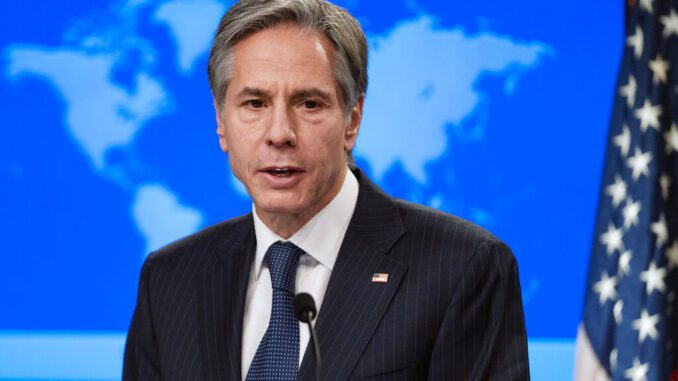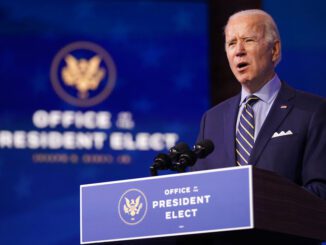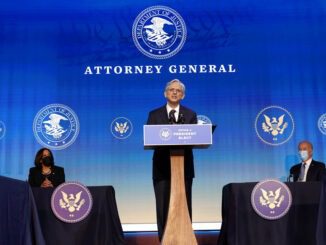
WASHINGTON, D.C. — Threats from China and North Korea will loom large over the Biden administration’s first Cabinet-level trip abroad, part of a larger effort to bolster U.S. influence and calm concerns about America’s role in Asia.
A senior administration official said Saturday that U.S. officials have tried to reach out to North Korea through multiple channels since last month, but have yet to receive a response. That makes consultations with the reclusive country’s neighbors, Japan, South Korea and China, all the more critical.
Secretary of State Antony Blinken and Defense Secretary Lloyd Austin are heading to Japan and South Korea for four days of talks starting Monday as the new administration tries to shore up partnerships with the two key regional allies. Blinken and Biden’s national security adviser, Jake Sullivan, will meet with Chinese officials in Anchorage, Alaska, on Thursday.
Blinken and Austin also plan virtual meetings with journalists, civil-society members and others. After reassuring their counterparts of U.S. commitments to Japanese and South Korean security, they plan to focus on an increasingly assertive China, the nuclear challenge from North Korea and the coronavirus pandemic.
In his first months in office, Biden has signaled his desire to return the Asia-Pacific to the top of the U.S. foreign policy agenda. In keeping with his broader “America is back” diplomatic theme, Biden has pledged to keep stability in the region at the core of his international initiatives.
On Friday, Biden participated in a virtual summit with the leaders of India, Japan and Australia. “A free and open Indo-Pacific is essential,” Biden said. “The United States is committed to working with you, our partners and all of our allies in the region to achieve stability.”
As part of that effort and “to reduce the risks of escalation,” the senior official said efforts had been made to connect with the North Koreans since mid-February, including through what is known as the “New York channel.” To date, the official said, “we have not received any response from Pyongyang.” The official was not authorized to publicly discuss the diplomatic outreach and spoke on condition of anonymity.
Meanwhile, U.S. and South Korean negotiators have overcome years of contentious discussions under Trump to reach a tentative deal on paying for the American troop presence in South Korea. That agreement, along with a similar one for Japan, will be front and center in Blinken and Austin’s meetings.
As he had done with allies in Europe, former President Donald Trump threatened to reduce security cooperation unless host countries paid more. That led to fears of troop withdrawals at a time of particular uncertainty as China boosts efforts to dominate the region and North Korea’s nuclear weapons remain a major source of angst.
“Diplomacy is back at the center of our foreign policy, and we are working to strengthen America’s relationships with our allies as well as the relationships among them,” said Sung Kim, who is the top U.S. diplomat for Asia. He served in the Philippines and Indonesia during the Trump administration and was also previously the special envoy for North Korea.
For all of Biden’s suggestions that he will reverse Trump’s overt hostility to China, Biden has yet to countermand a single one of his predecessor’s policies. He has, in fact, reaffirmed several of them, including maintaining sanctions in response to human rights abuses in western Xinjiang and Hong Kong and restating a Trump-era decision to reject outright nearly all of China’s maritime claims in the South China Sea.
Many of China’s policies that the U.S. finds objectionable — including its crackdown in Hong Kong, stepped up rhetoric against Taiwan and actions in the South China Sea — began during the Obama administration. The previous Democratic administration took office promising a “pivot to Asia” after a period of what many saw as American neglect for the region during George W. Bush’s presidency, which was consumed by the onset of wars in Afghanistan and Iraq.
In fact, although some obvious circumstances have changed since 2009, Blinken and Austin’s trip mirrors in many ways the initial overseas journey of President Barack Obama’s first secretary of state, Hillary Clinton, when she traveled to Japan, South Korea, Indonesia and then China in a bid to reassert U.S. interests in the Asia-Pacific. Obama’s engagement with China, however, did not produce the desired results, and the North Korean threat grew.
Although China is not on Blinken’s itinerary, after wrapping up the stop in Seoul, he will fly back to Washington via Anchorage, Alaska, where he and Sullivan will meet senior Chinese officials. Austin will go from Seoul to New Delhi for meetings with Indian leaders.
Still, the administration is convinced that its domestic efforts to revitalize the U.S. economy and step up the fight against COVID-19 have put it in a better position both to blunt Chinese ambitions directly and leverage its partnerships to do the same.
“After the work of the past 50 days, Secretary Blinken and I will enter the meeting with senior Chinese representatives from a position of strength,” Sulllivan said Friday.




